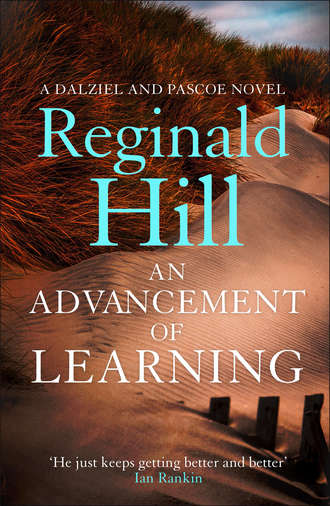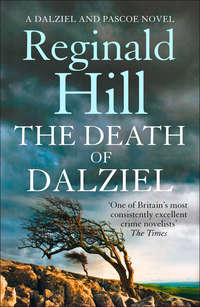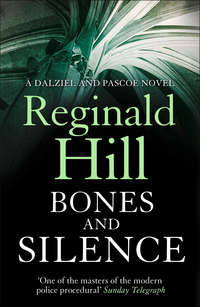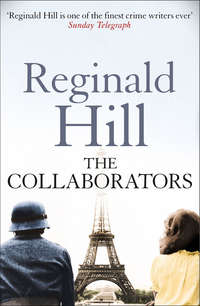
Полная версия
An Advancement of Learning
The principal had tried to soften the blow by pointing out that an integral part of this was to be a hot-house for experimental husbandry. And that the fish-pool would likewise be preserved as a source of water insects and algae.
But the bruised feelings of many of his staff were not so easily salved.
And when he announced that Miss Girling’s memorial would have to be shifted this seemed the central symbol of an act of needless and unwarranted desecration.
Now the moment had come. A canvas sling had been wrapped around Hippolyta, one strap passing between her legs, another two crossing beneath the magnificent breasts.
‘Note how they shine,’ said Henry. ‘Some student wit paints a bra on them at least once a year and they always get a good polish when the paint comes off.’
But neither Halfdane nor Landor was listening. They were watching Marion Cargo, who suddenly ran forward anxiously and spoke to the man in charge of the tying operation. He nodded his head reassuringly and moved her away with a gentle push at her shoulder.
Then he waved to the man in the cab, who began to take the strain. Slowly the great arm of the machine pulled back towards the sky. The statue resisted for a second, gave a little jerk, then was swinging free in a stately semi-circle towards the truck which was waiting to take it into storage till a new site was prepared. A little trail of powdered concrete fell off its feet like talcum powder whitening the green lawn.
‘A fine sight!’ breathed Henry.
‘Yes, indeed,’ said Landor.
Halfdane turned his attention from the statue to the watchers. A contingent of students had gathered and with an instinct for the end of prohibitions were using one of the larger rockeries as a grandstand. Franny Roote, the student president, a large, quiet-mannered youth, was there, marked out by his height and his very blond hair. As usual he had three or four attractive girls crowding around him. Most of the staff were standing in a semi-circle on the edge of the lawn nearest the building. Jane Scotby looked as if she were praying. ‘Walt’ Disney was looking with contempt at the man next to her. He was three or four inches shorter than she was, a little man with a big, loose, Glasgow mouth. This was George Dunbar, Head of Chemistry, who shared with Henry Saltecombe the distinction of being the first man appointed to the staff. The older women hated him.
Marion Cargo had moved back to the edge of the lawn. Her face was set and tense, but no less attractive because of it. Halfdane felt a slight stirring of interest and resolved once again to get to know her better. He noted with surprise that Fallowfield had appeared beside her, though he didn’t seem to be looking at the moving operation. Curious, he followed his gaze over to the students’ rockery and found the answer. Behind Roote had appeared the tall long-haired girl who had been pointed out to him as Anita Sewell.
‘There she goes,’ said Henry as Hippolyta was deposited gently into the back of the truck.
‘A perfect operation,’ said Landor, gratified. ‘Now there’s just the base.’
Halfdane had turned to go but he stopped when he saw no one else was moving. The tackle had been taken off the shovel-arm and it was now swinging back along the white path left by the statue. A workman was busy at the concrete base which remained sticking forlornly out of the ground. He was removing the commemorative plaque. When he had it in his hand, he turned uncertainly towards the staff.
‘Over here!’ called Miss Disney peremptorily, but Landor made a small motion with his hand and the man came directly to him.
Now the mouth of the grab was opened wide, like some monster in a horror film. The driver was manoeuvring it carefully into position over the base, following the foreman’s hand signals. Finally both were satisfied and the foreman stepped back.
‘He’ll never drag that thing out!’ said Henry, amazed. ‘It must weigh …’
The rest of his sentence was drowned as the arm went slack and the gaping grab crashed down with all the violence of its huge weight on to the concrete slab. The shining metal teeth dug gratingly into its sides as the driver manipulated the controls.
‘They can lift almost anything,’ said Landor, making it sound like a personal boast.
The arm began to pull up, the machine bucked forward slightly on its tracks and Halfdane began to have doubts.
Again it tried and again the same happened.
But the third time, just when it seemed the machine must capsize itself with its own strength, the concrete block stirred, the exquisitely mown turf, which ran up to the base as though the mower had gone right through it, began to buckle and tear, the great machine sat back triumphantly on its haunches and the solid cube began to slide slowly out like a cork. The rich dark earth clung tightly to its sides, and even more solidly to the bottom, it seemed, as the great block swung free in the air. It followed the same semi-circle as before, only this time earth fell to darken the white trail below.
Earth, and something more solid than earth.
‘Hold it, Joe!’ cried the foreman who was nearest. The machine halted, the concrete maintained its momentum and swung forward like a pendulum dislodging yet more of the substance that adhered to its base.
‘Oh, my God!’ said someone as the foreman stooped, then stood up gingerly with something long and thin in his hand.
It was a shin-bone.
He poked at the underside of the concrete with it. Something like a narrow grille fell down. It might have been part of a rib-cage, but no one watching was ready to believe it. He poked again, dislodging an even more solid something. The earth fell away as it hit the ground.
Now they were ready to believe it.
It was a skull, grinning empty-eyed at them. And most hideously there was a mop of dark red hair hanging rakishly down over where had been the left ear.
Jane Scotby’s hand went to her mouth, but only the dilating of her pupils showed she was not just stifling a little yawn; Marion Cargo was white as death, Henry Saltecombe gripped Halfdane’s shoulder with unconscious violence, while Ellie Soper seized his other hand so he could not move.
‘It’s Miss Girling!’ shrieked Miss Disney.
‘Yes, it is,’ she added in a matter-of-fact way as though someone had denied it. Then, unbelievably, she fainted into the reluctant arms of George Dunbar.
‘Clear a space,’ he shouted. ‘Hey, Fallowfield, give us a hand here.’
Fallowfield was the staff medical expert, having done two years of a medical degree course before abandoning it in favour of straight biology.
But when they looked for him now, he was nowhere to be found.
Chapter 3
… they are ill discoverers that think there is no land when they can see nothing but sea.
SIR FRANCIS BACON
Op. Cit.
‘This is what they spend my bloody taxes on, is it?’ said Detective-Superintendent Dalziel, peering out of the window of the principal’s study.
Sergeant Pascoe said nothing and kept his gaze fixed firmly on an area of neutral space midway between the balding, taurine figure at the window and the long, spare frame of Simeon Landor seated at his desk.
‘I sympathize,’ said Landor, smiling. ‘I feel much the same when I see the way you go about your work, Superintendent.’
‘Sorry?’ said Dalziel turning. ‘What’s that you said?’
He cupped a large hand to a proportionally large ear.
If the buggers get clever, he had once told Pascoe, pretend you can’t hear. Then pretend you can’t understand. Nothing’s funny if it’s repeated and explained.
Landor shook his head, still smiling.
‘Now, Superintendent,’ he said. ‘We want to help your enquiries in every possible way, of course. So just fire away with any questions you like.’
Oh God, groaned Pascoe. Honours even, so he extends the hand of friendship. Give the bull a scratch!
‘What was going on out there?’ asked Dalziel, pointing to the staff garden which the room overlooked. The mechanical digger had gone now but the deep furrows of its progress were still clearly visible. Over the cavity left by the removal of the concrete base a canvas shelter had been erected. Men were moving slowly, efficiently around, watched by a silent crowd of students on the edge.
‘We’re extending on all sides as you can see,’ said Landor. ‘A new biology lab is planned there, so naturally we had to move the statue.’
‘Who was out there watching?’
‘The principal was good enough to make out a list, sir,’ said Pascoe smartly in his best young executive manner, making a feint towards his brass-bound genuine-leather document case, an object of some derision from Dalziel when it first appeared.
‘Of course, it’s almost certainly incomplete,’ began Landor, but Dalziel waved aside his apologies along with Pascoe’s contribution and, by implication, any further interest in the list.
‘Why were they watching?’ he asked, scratching his inner left thigh voluptuously.
‘I’m sure I don’t know, Superintendent,’ laughed Landor, still pursuing his sweetness-and-light policy. ‘In most cases it would merely be the old hole-in-the-road syndrome …’
‘What?’
Landor was wise enough not to explain. Pascoe gave him a mental tick.
‘Was that all?’ asked Dalziel as if an explanation had been given.
‘Well, no. There were emotions other than mere curiosity on display, though I don’t see what they can have to do …’ He tailed off thoughtfully, then started again with renewed vigour.
‘Miss Cargo of our Art Department was there for a special reason. Concern, I suppose you’d call it. You see, she had designed the statue and was naturally concerned to see it suffered no damage.’
Pascoe was taking shorthand notes, a skill Dalziel mocked as feminine.
‘Then there were some older members of staff who were there to express their disapproval, I felt.’
‘Disapproval? Because their garden was being dug up?’
‘Partly that. But partly also because the statue was a memorial. They felt it smacked of sacrilege to pull it up.’
‘A memorial? Who to?’
In answer Landor picked up the bronze plaque from his desk and handed it over. Dalziel read it carefully with an expression of grotesque devoutness. Like a close-up in Songs of Praise on the telly, thought Pascoe.
‘Alison Girling,’ he said, enunciating each syllable with great care like a child reading.
‘My predecessor,’ explained Landor.
‘She wasn’t old,’ observed Dalziel. ‘What happened to her?’
‘A tragic accident,’ said Landor, doing with his voice what Dalziel had done with his face. ‘On holiday abroad at Christmas. She was a close friend of some of the senior staff here. They felt it deeply when the statue had to be moved.’
‘Who are they, Mr Landor?’ asked Dalziel. ‘And how deeply did they feel it?’
‘Well, Miss Scotby, she’s my Senior Tutor, and Miss Disney, who’s in charge of our divinity department, and very much the moral conscience of the college.’ He gave a snort which might have been amusement or amazement. ‘It was rather bizarre when those bones started to fall from the base of the statue. Miss Disney let out a kind of shriek and screamed, “It’s Miss Girling!” A Gothic notion, don’t you think?’
‘Bizarre,’ echoed Dalziel, as though savouring the word. ‘Gothic. Get that, Sergeant? You mean she reacted as if it was Miss Girling’s tombstone rather than just a memorial? Where is Miss Girling buried, as a matter of interest?’
‘I’m not certain. Austria, I believe. That’s where she died. It was all several months before I first came to the place, of course.’
‘Of course. Were you here when the memorial was erected, Mr Landor?’
The question was dropped very casually. Landor answered it just as casually.
‘No. No, I wasn’t. I didn’t take up the post till the beginning of the following academic year, September that is. And now I come to think of it, I’m sure the statue was up when I came for an interview here the previous March.’
‘Good, good,’ said Dalziel, suddenly expansive. ‘Very good.’
He came to a halt before an oil painting of a large amiable woman with warm blue eyes and bright red hair.
‘Why, it’s Miss Girling,’ he said, peering closely at the frame. ‘She’s well remembered, isn’t she?’
‘Yes,’ said Landor drily. ‘She is.’
There was a perfunctory knock at the door and a large well-rounded woman burst in. She had a formidable chest development, but it looked quite solid with no hint of a central cleavage, and seemed the natural descendant of a series of fleshy outcrops which began with her lower lip and progressed downward and outward through three chins.
She looked indignant, but this meant nothing, Pascoe decided. Her features didn’t seem equipped to deal satisfactorily with any other expression.
It turned out, however, that she was indignant.
‘Good morning, Miss Disney,’ began Landor. ‘I’m rather busy …’
‘Principal!’ she interrupted, ‘I really cannot tolerate this. I am scheduled this afternoon to conduct an extremely important seminar on Isaiah. But there’s no one there. No one!’
She paused triumphantly.
Landor eyed her warily.
‘Where are they, you ask? I’ll tell you. I’ll show you. They are there.’
A dramatic arm was stretched out towards the window and the garden beyond.
‘Look at them! That boy Roote, he should have been reading a paper at my class. He has degenerated visibly since becoming President of the Union. I knew it was the beginning of the end when we admitted men in the first place. We never had this kind of trouble in Miss Girling’s day!’
Once again Landor showed his quality.
‘I’m glad you called, Miss Disney,’ he said blandly. ‘We were just talking about you, the superintendent and I. I know he wants to ask you a few questions. Please use my study for any interviews you care to make, Superintendent. I’ll be with the Registrar if needed.’
He was out of the room before anyone could reply. Miss Disney seemed ready to pursue him through the door, with or without opening it, but Dalziel stepped forward smartly.
‘Please sit down, Miss Disney. You have had a trying day. These things hit some of us more than others, I know. It’s a question of sensitivity.’
Oh Christ, scribbled Pascoe in his neat shorthand. Extreme Unction. Oily Dalziel oozing over stormy Disney.
Neatly he scratched it out and waited.
Miss Disney glared at Dalziel, decided here was a soulmate, and made her way round to Landor’s chair behind the large desk, which seemed to swell visibly as though to take on the proportions of its new incumbent.
‘Well?’
‘Mr Landor told us how distressed you were this morning.’
Miss Disney was obviously reluctant to agree with any diagnosis from the principal, but Dalziel pressed on.
‘I believe you were against the despoiling of the garden?’
It was a good word. Disney nodded emphatically, her chins and jowls tossing in sprightly dance.
‘Indeed I was. I am! For many reasons. It has always been a place of comfort and repose for those of us not utterly unresponsive to natural beauty. It is almost the only remaining link with the college as it was before all this. And if this were not enough, it is in its own way, which is a very real way, a shrine to the memory of dear Miss Girling.’
She sniffed and took an absurdly small lace handkerchief from her capacious sleeve. Pascoe would have been less surprised to see her pull out the flags of the nations of Europe all strung together.
Dalziel clucked sympathetically.
‘Forgive me for asking,’ he said in a low, vibrantly sincere voice television interviewers use when questioning the tragically bereaved, ‘but why did you say that it was Miss Girling when the – er – decedent’s remains came into view?’
‘It was silly, I know,’ said Miss Disney almost girlishly. ‘But dear Alison was so much in my mind, as you might imagine. And when I saw the bones and the hair …’
She broke off and looked up at the portrait on the wall.
‘She had such lovely red hair, you know. You can’t imagine how it used to be here in the old days. Just a handful of staff and a hundred or so girls. We knew them all by name. Al’s gals, we used to call them. Such nice, decent girls too. Whereas now …!’
‘So it was the hair …?’ prompted Dalziel.
‘Yes, Superintendent. It was as if Alison had risen from her distant grave to reproach me for permitting all this to happen.’
‘So you passed out?’ Dalziel’s tone was suddenly casually conversational again.
‘I fainted,’ said Miss Disney, moving just as rapidly from the submissive female to her previous role. ‘I must say, Inspector, that I cannot really see how this line of enquiry is relevant. It’s not the uncovering but the burying of these bones which is surely of interest. And that must have happened at least six years ago. Now I must go and teach the remnants of my class.’
She stalked to the door, but paused there a moment as if reluctant to exit on an altogether damnatory note.
‘I’ll tell you one thing, Superintendent,’ she said, reinstating him in his proper rank. ‘Those bones are not all that is buried here. This is no longer a happy place. There is godlessness at work in this college, on all levels. Good day to you.’
Pascoe managed to get the door open before she walked through it. He closed it gently behind her.
Dalziel had seated himself at the principal’s desk and was dialling a number on the internal phone.
‘Hello, love,’ he said. ‘Any chance of some tea for a thirsty policeman? In the principal’s study. Oh, he has, has he? That’s nice. For two? That’s right, tea for two.’
He put the phone down.
‘They’re making us welcome,’ he said. ‘Well now, Sergeant, this is more your kind of scene, as they say. I’m out of my depth here in all this academic intellectual stuff. So what do you make of it?’
Pascoe did not believe a word of this modest disclaimer, but he knew better than to say so. He had a degree in Social Sciences, a qualification Dalziel frequently treated with mock-deference. But when he asked you a question, he listened to what was said, despite all appearances to the contrary.
‘It’s not an unusual kind of situation here,’ he said. ‘The educational expansion programme of the sixties took places like this used to be by the neck and shook them up a bit. Government started thinking industrially about education, that is in terms of plant efficiency, productivity, quotas, etc. Small colleges such as this was could become four or five times larger in as many years.’
‘Could? You mean there was a choice?’ Dalziel sounded faintly incredulous.
‘To some extent. You can’t be too autocratic with an educational system based on liberal principles. Really what it boiled down to was the willingness of those in charge to co-operate. If you dug your heels in, progress was slow. If you went out after money and expansion, it could be relatively rapid. Landor’s obviously an expansionist.’
‘And her?’ Dalziel nodded at the portrait.
‘It sounds as if she was the other kind. A digger-in of heels.’
Dalziel suddenly seemed to lose interest.
‘What do you think Disney meant by “godlessness”? Are they groping each other during her lectures, or something?’
‘I don’t know,’ said Pascoe thoughtfully. ‘Probably just that. Your modern students have come a long way from “Al’s gals” I should imagine. But I can probably find out. I’ve been looking at the staff-list. There’s someone here I was at university with. She’s a lecturer in the Social Sciences department.’
He kept his tone casual but Dalziel, as always, was on to him in a flash.
‘She?’
‘Yes. She. It was a mixed university.’
‘She,’ said Dalziel again, nodding as if some dreadful fear about his sergeant had been confirmed. ‘A close friend?’
‘Close enough. What’s next on the agenda, sir?’
‘Still close?’
‘Hardly. It’s several years now, and …’
‘What?’
‘Didn’t you know, sir? I became a policeman.’
Dalziel let the sarcasm pass unreproved, though not unrecorded. But at least he left the subject.
‘Right,’ he said. ‘Now check them all. I want to find out who was here five years ago.’
‘I’ve made some enquiries already,’ said Pascoe. ‘Very few.’
‘Fine. Similarly with clerical and domestic staff. Next, a list of everyone who was here five years ago and has since moved on.’
‘Excuse me, sir,’ said Pascoe deferentially. ‘Can we really make the assumption that five years is the significant period?’
‘What do you mean?’
‘Can we be certain that this body was put into the hole which had been dug for the statue in the short period between its being dug and the base being dropped into it? Couldn’t the body have been in the ground already when the hole was dug? Or isn’t it even possible that it was buried there later, a hole dug down the side of the base, a groove scraped in the earth underneath the base, and the body pushed into this?’
Dalziel groaned dramatically.
‘It’s all possible, lad,’ he said. ‘It’s possible this was a lost pot-holer trying to dig his way to the surface. But it’s unlikely. I just think it’s unlikely, but then I’m a simple soul, not over-gifted intellectually. But you’re different. And when you’ve done all the other things you’re going to do, just get yourself out there and find me half a dozen good reasons why we can discount your possibilities. Right?’
‘Yes, sir,’ said Pascoe.
‘Good. Next, I want a list of all persons reported missing in the area between, let’s see, when was that blasted statue put up, January let’s say, all right, between the previous October and the following April. Better make it the whole year, from July to July. And make sure I get the lab-report on the bones as soon as it’s ready. I don’t want any ambitious young officer working at his career prospects through it for a couple of hours first.’
There was a tap at the door. A pretty, young girl in a blue nylon overall came in carrying a tray which she placed on the desk.
‘Thank you, my dear,’ said Dalziel with a beam. ‘We’ll just be needing one cup. The sergeant has to go out.’
Pascoe ushered the girl out in front of him, then stopped and turned as Miss Disney had done.
‘By the way, sir,’ he said. ‘Did you get a look at the statue when we arrived?’
‘No,’ said Dalziel, without interest. ‘It’s the base that concerns us here.’
‘Of course,’ said Pascoe. ‘It just seemed a little strange, that’s all.’
He made as if to go. Dalziel’s expected bellow stopped him.
‘In what way strange?’
‘Just strange that the memorial to a woman like Miss Girling should be an eight-foot-tall bronze nude.’
He closed the door quietly behind him. Inside, Dalziel sipped his tea with noisy relish and eyed the portrait of Miss Girling with interested speculation.
Chapter 4
Men’s weaknesses and faults are best known from their enemies, their virtues and abilities from their familiar friends.
SIR FRANCIS BACON
Op. Cit.
Franny Roote lay back along the window-sill, his still form blocking out the sunlight. He was wearing his usual summer dress of white beach-shoes, light cream-coloured slacks and a white shirt which was almost a blouse. This colour scheme combined with his own fair colouring somehow blurred the edges of his frame. Without moving, he dominated the room. Only twenty-three, he had developed a repose and still self-sufficiency beyond the reach of many twice his age; and these things put together gave him the indistinct almost inhuman menace of a figure magnified and blurred by sea-mist. It was an image he worked at.
‘You heard nothing more, Elizabeth?’ he asked quietly.









